Objectives: in the French national health insurance information system (SNDS) three diabetes case definition algorithms are applied to identify diabetic patients. The objective of this study was to validate those using data from a large cohort. Methods: the CONSTANCES cohort (Cohorte des consultants des Centres d'examens de santé) comprises a randomly selected sample of adults living in France. Between 2012 and 2014, data from 45,739 participants recorded in a self-administrated questionnaire and in a medical examination were linked to the SNDS. Two gold standards were defined: known diabetes and pharmacologically treated diabetes. Sensitivity, specificity, positive and negative predictive values (PPV, NPV) and kappa coefficients (k) were estimated. Results: all three algorithms had specificities and NPV over 99%. Their sensitivities ranged from 73 to 77% in algorithm A, to 86 and 97% in algorithm B and to 93 and 99% in algorithm C, when identifying known and pharmacologically treated diabetes, respectively. Algorithm C had the highest k when using known diabetes as the gold standard (0.95). Algorithm B had the highest k (0.98) when testing for pharmacologically treated diabetes. Conclusions: the SNDS is an excellent source for diabetes surveillance and studies on diabetes since the case definition algorithms applied have very good test performances.
Auteur : Fuentes Sonsoles, Cosson Emmanuel, Mandereau-Bruno Laurence, Fagot-Campagna Anne, Bernillon Pascale, Goldberg Marcel, Fosse-Edorh Sandrine
International Journal of Public Health, 2019, vol. 64, n°. 3, p. 441-450


